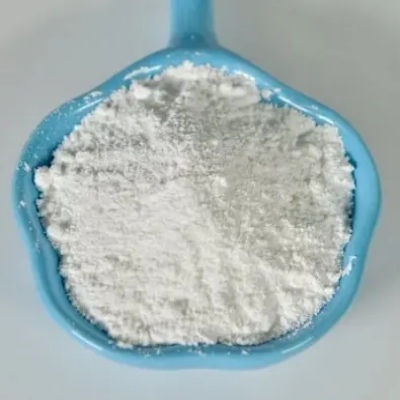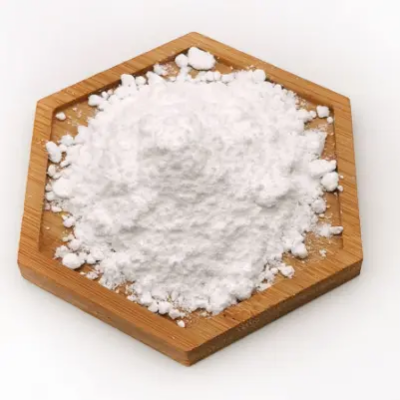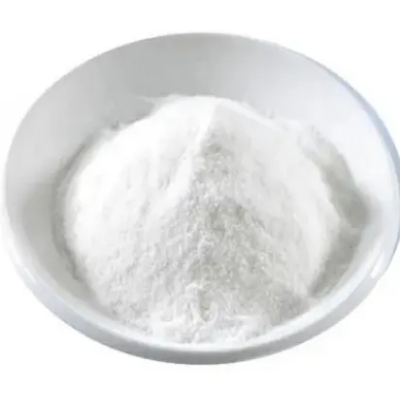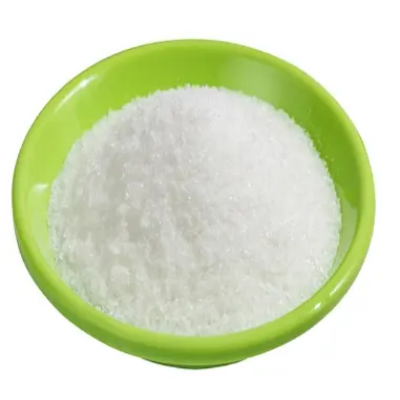-
![6-Chlorothiazolo[4,5-b]pyridine CAS:1780572-16-8](https://cdn.globalso.com/xindaobiotech/8NS8DBIRAVXN0VCLT162.png)
6-Chlorothiazolo[4,5-b]pyridine CAS:1780572-16-8
6-Chlorothiazolo[4,5-b]pyridine is a heterocyclic compound with diverse applications in the fields of pharmaceuticals, agrochemicals, and materials science. Its unique molecular structure makes it a valuable building block for the synthesis of various biologically active compounds and functional materials. With a chloro substituent at the 6-position and a fused thiazole-pyridine ring system, it exhibits favorable reactivity profiles and physicochemical properties, rendering it an indispensable tool in organic synthesis.
-
![5-Hydroxyhexahydrocyclopenta[c]pyrrole-2(1H)-carboxylicacidtert-butylester CAS:203663-25-6](https://cdn.globalso.com/xindaobiotech/NIQ7288PPWVEXNL@IMY194.png)
5-Hydroxyhexahydrocyclopenta[c]pyrrole-2(1H)-carboxylicacidtert-butylester CAS:203663-25-6
5-Hydroxyhexahydrocyclopenta[c]pyrrole-2(1H)-carboxylic acid tert-butyl ester is a chemical compound with diverse applications in pharmaceutical and chemical synthesis. Its molecular structure consists of a cyclopentapyrrole ring with a hydroxy group and a carboxylic acid moiety, along with a tert-butyl ester, imparting unique chemical properties crucial for various applications. This compound serves as a valuable intermediate for the synthesis of biologically active molecules and functional materials, contributing significantly to drug discovery and organic chemistry research.
-
![tert-butyl 5-amino-hexahydrocyclopenta[c]pyrrole-2(1H)-carboxylate CAS:1031335-28-0](https://cdn.globalso.com/xindaobiotech/V3@A6KDXTE0I05WML149.png)
tert-butyl 5-amino-hexahydrocyclopenta[c]pyrrole-2(1H)-carboxylate CAS:1031335-28-0
Tert-butyl 5-amino-hexahydrocyclopenta[c]pyrrole-2(1H)-carboxylate is a compound utilized in pharmaceutical and chemical synthesis. Its molecular structure features a cyclopentapyrrole ring with an amino group and a carboxylate moiety, alongside a tert-butyl group, providing it with distinctive chemical properties crucial for various applications. This compound serves as a valuable intermediate for synthesizing biologically active molecules and functional materials, contributing significantly to drug discovery and organic chemistry research.
-
![5-Hydroxyhexahydrocyclopenta[c]pyrrole-2(1H)-carboxylicacidtert-butylester CAS: 203663-25-6](https://cdn.globalso.com/xindaobiotech/K@NIE7HBAEP6E7J7DS170.png)
5-Hydroxyhexahydrocyclopenta[c]pyrrole-2(1H)-carboxylicacidtert-butylester CAS: 203663-25-6
5-Hydroxyhexahydrocyclopenta[c]pyrrole-2(1H)-carboxylic acid tert-butyl ester is a versatile compound with significant applications in pharmaceutical and chemical synthesis. Its molecular structure features a cyclopentapyrrole ring with a hydroxy group and a carboxylic acid moiety, alongside a tert-butyl ester, endowing it with unique chemical properties essential for various applications. This compound serves as a valuable intermediate for synthesizing biologically active molecules and functional materials, thereby contributing significantly to drug discovery and organic chemistry research.
-
![4-Chloro-2-(trifluoromethyl)pyrazolo[1,5-a]pyrazine CAS:877402-79-4](https://cdn.globalso.com/xindaobiotech/HSUS81DS80Y35NTEZTU204.png)
4-Chloro-2-(trifluoromethyl)pyrazolo[1,5-a]pyrazine CAS:877402-79-4
4-Chloro-2-(trifluoromethyl)pyrazolo[1,5-a]pyrazine is a heterocyclic compound widely employed in pharmaceutical and agrochemical industries. Its molecular structure consists of a pyrazolo-pyrazine ring system with a chloro substituent at the 4-position and a trifluoromethyl group, imparting unique chemical properties crucial for various applications. This compound serves as a valuable scaffold for the synthesis of biologically active molecules and functional materials, owing to its favorable reactivity and versatility in organic synthesis.
-
![2-(Trifluoromethyl)pyrazolo[1,5-a]pyrazin-4-ol CAS:877402-82-9](https://cdn.globalso.com/xindaobiotech/6FOL1BS0UMD0X9Z402211.png)
2-(Trifluoromethyl)pyrazolo[1,5-a]pyrazin-4-ol CAS:877402-82-9
2-(Trifluoromethyl)pyrazolo[1,5-a]pyrazin-4-ol is a heterocyclic compound with notable applications in pharmaceutical and materials science domains. Its molecular structure features a pyrazolo-pyrazinol ring system with a trifluoromethyl group at the 2-position, imparting distinct chemical properties essential for diverse applications. This compound serves as a valuable building block for the synthesis of biologically active molecules and functional materials due to its favorable reactivity and structural characteristics.
-

(S)-tert-Butyl3-(2-hydroxyethyl)piperazine-1-carboxylate CAS:1273577-11-9
(S)-tert-Butyl 3-(2-hydroxyethyl)piperazine-1-carboxylate is a compound with versatile applications in pharmaceutical and chemical synthesis. Its molecular structure features a piperazine ring with a tert-butyl group and a carboxylate moiety, along with a hydroxyethyl substituent, imparting unique chemical properties essential for various applications. This compound serves as a valuable intermediate for the synthesis of biologically active molecules and functional materials, playing a significant role in drug discovery and organic chemistry research.
-

(S)-5-Phenylmorpholin-3-one CAS:1052209-96-7
(S)-5-Phenylmorpholin-3-one is a chiral cyclic compound notable for its applications in pharmaceutical synthesis and chemical research. Its molecular structure comprises a morpholinone ring with a phenyl substituent, possessing unique stereochemical properties crucial for diverse applications. This compound serves as a valuable chiral building block for the synthesis of enantiomerically pure molecules and pharmaceutical intermediates, facilitating the development of therapeutically relevant compounds and molecular probes.
-

(S)-4-(Hydroxymethyl)pyrrolidin-2-one CAS: 476423-84-4
(S)-4-(Hydroxymethyl)pyrrolidin-2-one is a chemical compound with versatile applications in pharmaceutical and chemical synthesis. Its molecular structure consists of a pyrrolidin-2-one ring with a hydroxymethyl group, exhibiting unique chemical properties crucial for various applications. This compound serves as a valuable intermediate for the synthesis of biologically active molecules and functional materials, contributing significantly to drug discovery and organic chemistry research.
-

(R)-Amino-(tetrahydro-pyran-4-yl)-acetic acid methyl ester CAS:871301-35-8
(R)-Amino-(tetrahydro-pyran-4-yl)-acetic acid methyl ester is a chiral compound with notable applications in pharmaceutical synthesis and chemical research. Its molecular structure comprises a tetrahydropyran ring with an amino-acetic acid moiety, exhibiting distinct stereochemical properties crucial for various applications. This compound serves as a valuable chiral building block for the synthesis of enantiomerically pure molecules and pharmaceutical intermediates, facilitating the development of therapeutically relevant compounds and molecular probes.
-

(1S,2S)-2-(2-isopropoxyethylamino)cyclopentanol hydrochloride CAS: 1599293-28-3 199293-70-9
(1S,2S)-2-(2-isopropoxyethylamino)cyclopentanol hydrochloride is a chemical compound with versatile applications in pharmaceutical and chemical synthesis. Its molecular structure consists of a cyclopentanol ring with an amino group attached via a 2-isopropoxyethyl chain, along with a hydrochloride salt, imparting unique chemical properties crucial for various applications. This compound serves as a valuable intermediate for the synthesis of biologically active molecules and functional materials, playing a significant role in drug discovery and organic chemistry research.
-

(3S,4R)-1-benzyl-4-hydroxy-5-oxopyrrolidine-3-carboxylic acid CAS:871086-00-9
(3S,4R)-1-benzyl-4-hydroxy-5-oxopyrrolidine-3-carboxylic acid is a chiral compound with significant applications in pharmaceutical synthesis and chemical research. Its molecular structure comprises a pyrrolidine ring with a benzyl group and a carboxylic acid moiety, along with a hydroxy substituent, exhibiting distinct stereochemical properties crucial for various applications. This compound serves as a valuable intermediate for the synthesis of biologically active molecules and functional materials, playing a significant role in drug discovery and organic chemistry research.

